I know it is a corny old line, but Old Trafford really was the Theatre of Dreams on that rare sunny Saturday in May 2024. I had the luxury of contemplating greatness from the touchline during the game as I looked over the pitch and up, across the stand named in honour of Sir Alex Ferguson, the coach I most admire.
The win over Manchester United, and our fifth successive Women’s Super League title, was secure. Two goals up in eight minutes, four goals ahead at half time, our lead stretched to five two minutes into the second half. I was lost in the moment long before Fran Kirby, Chelsea’s record goalscorer, added a sixth in her final appearance for the club.
I was in Sir Alex’s home. I felt his presence in the posh seats behind me when I looked back to share the occasion with the travelling fans who had our back in tough times. I thought of the standards he instilled, the values he represented, the wisdom he espoused over 27 years.
His longevity befits his legend. It is a source of enduring regret that, because of the post-match melee, we never got to share the glass of red wine we had promised ourselves. I’m conscious that, as a fellow coach, I’m privileged to have the opportunity to stand on the shoulders of such a giant.
Given the context of my final season at Chelsea, that WSL title, our eighth in 10 years when you take the Covid-era Spring Series into account, stands as my greatest managerial achievement. Watching my team demonstrate everything our programme represented, decisively and under the most intense pressure, was impossibly poignant.
The group endured a series of gut punches. The loss of Sam Kerr to injury, and having Millie Bright out for so long, stripped a transitional team of experience. The disappointment of defeat to Arsenal in the League Cup final, to a single goal late in extra time, was compounded by semi-final losses to Manchester United in the FA Cup and Barcelona in the Champions League.
They are a special set of human beings. I had to teach them important lessons in adversity, remind them that success doesn’t come without a struggle. The collective character they showed proved they had listened to my mantra that reputation and past achievement offer no guarantee of a medal around your neck.
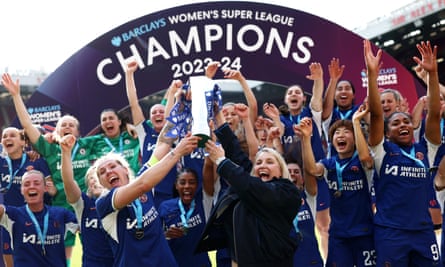
There’s a lot of loose talk about legacy, but I’m proud of winning while developing young players of the quality of Maika Hamano and Aggie Beever-Jones and easing seasoned players into more unaccustomed supporting roles for the common good.
Forget the obsession with style, a coach’s ego trip. This group proved you can’t win football matches playing the same way every time. They did what they needed to do, despite the daunting logic that odds were against them.
There have been nonsensical suggestions I was indulging in mind games when I effectively conceded the title after we lost at Liverpool on 1 May, 17 days before the season’s climax. I was merely dealing in realities, because had we enjoyed the advantage given to Manchester City by that loss, we would have got the job done.
Instead, the following Sunday, I sat in the car outside our Kingsmeadow ground with Denise Reddy listening to City’s late defeat to Arsenal. “We’re going to do this,” I told her as we made our way into the dressing room before our late home game against Bristol City.
The atmosphere was electric. The door was ajar and metaphorically kicked in by an 8-0 win that gave us a favourable goal difference, that was extended in the two remaining games.
We squeezed the last drop out of the lemon. I certainly had nothing left to give. The marrow had been sucked dry. I had spoken several times to Jürgen Klopp, who was enduring his own farewell tour at Liverpool, about the mind-numbing tiredness our job generates.
We related to each other on a visceral level and vowed that things in our profession had to change. It has reached the point where the expectations and obligations are actively detrimental to a coach’s mental health.
Leadership involves the management of emotion. I was obviously conscious that it was my last season at Chelsea, but I couldn’t allow that to set the tone. I condensed my approach, so that I concentrated only on what was important. I found that quite liberating.
My focus was on the people I worked with, the players and the fans. I spent more time with supporters, before and after matches. I redoubled my efforts in creating the best possible environment for my squad, knowing that our time together was finite and precious.
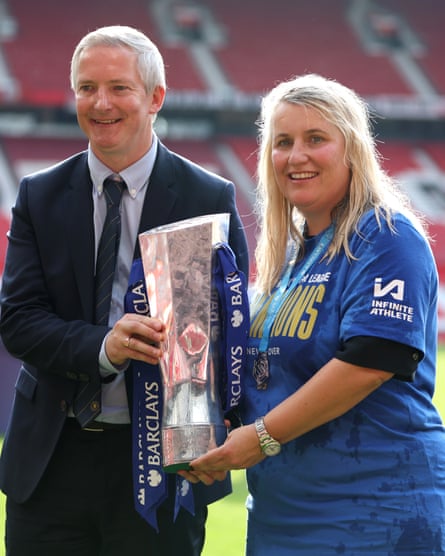
I stayed away from the politics of everything else. I took extraneous matters, commercial considerations, marketing campaigns, the wider issues of the game’s development, out of the equation. I returned to a place that had been increasingly harder for me to reach as the Chelsea project evolved.
I rediscovered the value of a purity of purpose. My successors will not have to deal with the bullshit I had to deal with in my 12 years in charge at Chelsea. They will not have to fight to play on a properly tended pitch, prepare in decent dressing rooms, and work out in an appropriately equipped gym.
They won’t have to move stadiums, fight to be established under the main banner of the football club, rather than being regarded as an offshoot of its charitable foundation. ‘Soon after I departed, Chelsea announced a new long-term strategy for the women’s team, designed to facilitate an eight-figure budget. Mine improved incrementally from £65,000 to £150,000, £250,000 to £400,000, £1.2m to £2m, £4m to £5m.
In my early days I helped to roll pitches at Staines to get a game on. I paid for meals, even paid for players. I paid Sofia Jakobsson’s £5,000 transfer fee out of my own money in 2013, through a foreign exchange business I ran. I never got it back, by the way …
I really wanted to build something. I know leaders say they want to leave things in a better place for those who follow them through the door. That’s a given. But I wanted to leave Chelsea in a place where all my successor had to do was focus on being a football coach and manager.
I had a choice to make in creating a culture. Do the other stuff, the irritating and distracting stuff, or let everyone suffer because there was no one else to do it. I always had Paul Green, my general manager, by my side, but I had to lead from the front.
We built a club from the ground up. We went from being just about in the top 100 in the world to definitely being in the top three in the world. We made a Champions League final with a budget of £2m. Barcelona, our opponents, worked with £15m. Lyon, perennial winners, were given £20m a season.
I did get teary, driving into training in those final months, thinking about someone else leading my group. I had to work so hard at not feeling anxious about what I was losing. I pushed myself to feel excited for those players. They have a new chapter to write, a new voice to respond to, much in the same way I will be thrilled by my new environment.
I also know those bonds are never going to be broken. We talk about teams as families, and sometimes that can be translated literally. To give an example, I looked at Facebook recently, and saw one of my former players, Emily Martin, who retired to the US, had just had her second child. I started crying, recalling how she went through a stage in her life and career when she looked a little lost. I worried so much about her, but to see her looking so happy made me realise I will remain in the lives of the players I left behind at Chelsea. I will watch out for them.
I will watch the team from afar, as a fan. I just hope they invite me to their cup finals, as a guest. I’d love to be on the halfway line, close to them when they lift their trophies. I look forward to watching the progress of a new generation.
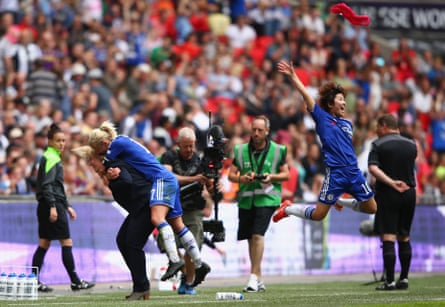
The club will remain part of my family’s life. My niece Isabella wouldn’t speak to me for a couple of weeks after I got the job as manager of the USA national team. Those Chelsea players were her role models.
I see great NFL coaches, like Bill Belichick and Pete Carroll, creating and leaving dynasties. I asked myself whether I wanted to stay on as long as Sir Alex at Manchester United. I genuinely thought I’d be at Chelsea for life, progressing from coaching to being sporting director and board member, but it hasn’t worked out that way. Sixteen trophies in 12 years will have to do.
You probably won’t be surprised to learn there is another photograph on my kitchen wall that means an awful lot to me. It is of our first FA Cup final win in 2015 against Notts County. The final whistle has just blown. Rick Passmoor, an old-school manager but a consistent ally and a great guy, turns in disappointment to his staff on the County bench. To his right, Ji So-yun, who had scored the game’s only goal, leaps high in the air. A two-man TV crew, a sign of burgeoning interest, homes in on her exultation. A couple of feet away Katie Chapman, a leader and mother, dives on to my back, giving me whiplash. On the left-hand edge of the frame, the fourth official starts to stride towards the pitch. I knew on that day Rebecca Welch would be a star. With significantly less experience than me, in my field, she went on to become the first female referee of a Premier League game, just before Christmas 2023.
That’s progress. I’m not taking anything away from her, but we should not shy away from asking why such a welcome development is possible in officiating but not, it seems, in coaching. How, and more pertinently why, is that possible? It’s a scratched record conversation. It doesn’t move. We might pick up the needle now and again, but it goes to the same place. It catches a little bit of fluff. We might hit the next track occasionally, but it always reverts to the beginning.
We have to ask ourselves fundamental questions. Why is that? It has nothing to do with talent. So much misogyny is stage managed through social media. It’s painful and tiring to be subjected to it. Over the last year, I have never felt more exhausted by the amount of casual sexism I have experienced. The higher I have climbed the ladder, the worse it has got. The level of scrutiny to which you are exposed means you have to ask yourself whether it is worth it.
It is almost as if I am regarded as an existential threat, instead of a colleague with great experience. It confronts you in so many ways. On one level I try to understand it, in that some people are threatened by points of difference, but it all comes back to education and self-awareness. So many people are so unaware of their ignorance, of how little they know, and how susceptible they are to bias. The familiarity of maleness feels natural to them. But the broader lesson is that we must all evolve or die.
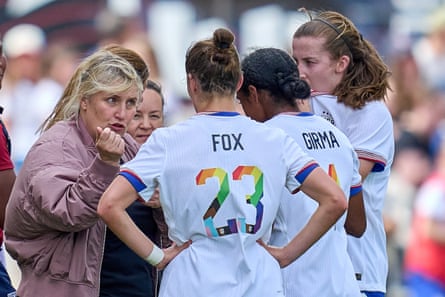
People parrot complaints about cancel culture or a supposed lack of freedom of speech. That’s so much nonsense. You can more or less say what you like on social media. Accountability is a convenient myth for grifters, malcontents, and cowards. No one is going to take their platform away. They’re unaware that for so long all the food has been on one huge table, set for the same people. The rest of us are clustered around small tables, hoping for scraps and crumbs. We should intermingle more. It’s healthy. A more diverse ecosystem offers greater choice and opportunity.
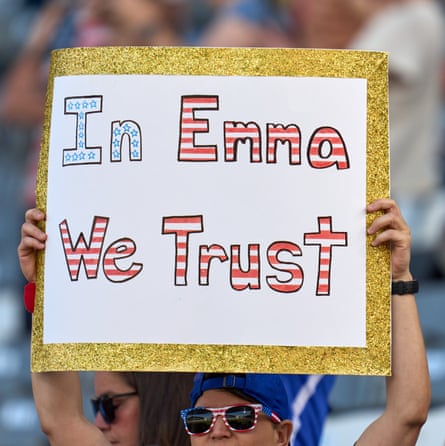
I believe in dynamic environments. I can’t wrap my head around the fact elite sport is so one-dimensional. It lacks balance in so many different ways. A healthy society and a healthy atmosphere are the result of difference, whether that is male or female, Black or white. Everybody in the room is the same. Footballers deal with emotional problems, suppressed insecurity. Countering that is not necessarily about a woman’s touch. I could go into a dressing room and deal with sensitive issues in the same way that Ian Wright, my friend and soul mate, could do so. Oh, by the way, women can work in a men’s dressing room without wanting to sleep with them.
I cannot imagine myself coaching in the WSL again, although when I do come back from the States I will do so as a supporter of my club, watching every week. Who knows, I may be so enriched by my experiences in international football that I enter the men’s game. I can’t rule that out, regardless of the damage caused by so much crude misogyny.
That isn’t necessarily about what I want but rather about clubs and owners being prepared to take the leap of faith. I don’t want to get too far ahead of myself, but after a minimum of five years with the USWNT, I will have a skill set beyond many of my male counterparts.
I understand the realities. It is easier for Nick Cushing to go from Manchester City, in the women’s game, to Red Bull Leipzig, or for Tony Gustavsson, the Matildas’ coach, to become assistant manager of the Swedish men’s team. They’re male. I’m disadvantaged just because I am female. When you have grown up, and all you have known, seen, and heard are people who look and sound like you, attitudes are shaped accordingly. Change can be threatening.
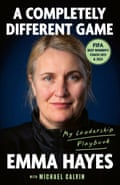
We talk a lot about representation in sport, and the realities are that football, in terms of senior management and leadership, has never been representative of our society. We have seen the struggle year on year of Black and ethnic minority coaches and candidates to make a breakthrough.
I remember a therapist once telling me that the more you push something down, the more it squeezes out sideways. That’s how I feel when I consider how many more blocks or excuses or diversions are going to be created before someone sees the value in change. Our game needs to be future-proofed by the provision of opportunity for all.
I can’t see it happening in England – where the merry-go-round of mediocrity still spins – for a long time. But I can see it happening in the US, for sure. I’m emboldened and energised by the challenge I’ve taken on. Let’s hope, to borrow a line from my first presentation to my US players and staff, the tables are starting to turn.
Source: theguardian.com


















